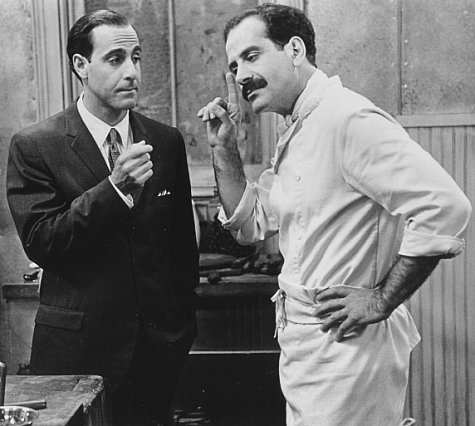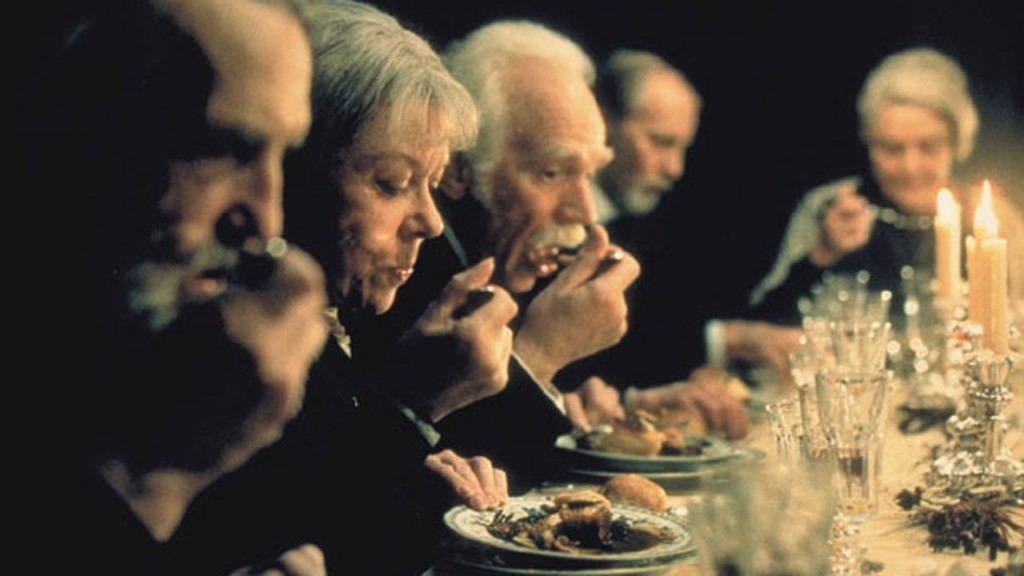 That’s Stanley Tucci (left) and Anthony Shaloub as a pair of devoted but mismatched brothers running an Italian restaurant in the 1996 film Big Night. Primo (Shaloub) is a gifted chef who longs to express himself through his mastery of classic Italian cuisine; bro Secondo (Tucci) just wants to fill the dining room with paying customers.
That’s Stanley Tucci (left) and Anthony Shaloub as a pair of devoted but mismatched brothers running an Italian restaurant in the 1996 film Big Night. Primo (Shaloub) is a gifted chef who longs to express himself through his mastery of classic Italian cuisine; bro Secondo (Tucci) just wants to fill the dining room with paying customers.
This proves problematic since the high-strung chef is too proud to serve up the Italian-American glop that would make their little resto a success.The sibs briefly consider throwing in the torchon, then decide to risk everything on a single go-for-broke, blow-out event – the big night of the title.
Chef Primo goes to extraordinary lengths to prepare a spectacular meal. Guests in a what-the-hell mood gorge themselves as a series of betrayals are revealed. One by one the disillusioned revelers say goodnight until only the brothers are left.
Compare this with Gabriel Axel’s 1987 film adaptation of Isak Dinesen’s novella Babette’s Feast. The story is set in the bleak landscape of Jutland where a French woman, Babette, fleeing reprisals against the insurgents of the 1871 Paris Commune, is given refuge in a severely moralistic, self-denying Protestant community. Her French ways seem strange, even vaguely diabolical, to her rural Danish neighbors.
Babette accommodates herself to the sect’s primitive dietary regimen as the congregants descend into petty jealousies and grudge-bearing. When Babette learns she has drawn a winning French lottery ticket, she can think of nothing better to do with the money than stage a magnificent supper for her aged hosts and their neighbors.

The final 30 minutes of the film depict preparations for the meal and the scene at the table (above) as we watch a succession of Babette’s dishes first tenderize then restore the cranky oldies to their humanity. Youthful indiscretions are recalled, trepasses forgiven.
Later, her guests totter out into the night, gaze at the stars, embrace, and drift homeward, transformed by their experience at Babette’s table. The message appears to be that in the hands of a true artist food and wine have the power to renew and restore the spirit as well as the body.
In stark contrast to the glowing finale ofBabette’s Feast, the last frames of Big Night are deflating. As the brothers pull up chairs in the resto’s little kitchen the mood is desultory, resigned. Hours after the train of elaborate dishes, they’re right back where they started, discouraged and hungry to boot.
Babette may be the more rewarding film to watch, in part because it affirms that there are times when a single shared meal can have a transformative, even transcendent effect – something we would all like to believe. Meanwhile, Big Night reminds us that hunger is the interest we pay on a recurring debt for which eating provides a reprieve but no permanent release.
It’s a less ennobling truth, perhaps, but one we can’t lose sight of. There’s simply nothing more fundamental to our shared humanity than the common need to eat with regularity and a measure of ritual. I’ll leave you to decide whether the former represents a French approach to the problem of appetite and satisfaction, and the latter the Italian take on it. But it seem to me that neither gives the full picture. Each is incomplete without the other.
Primo, Babette, we need you both.